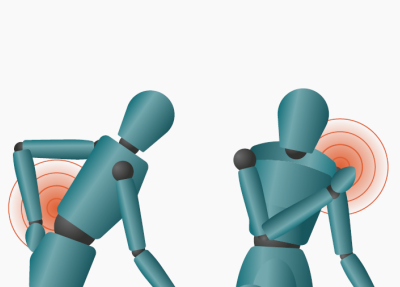We are working to continuously develop the Musculoskeletal Disorder (MSD) Prevention Guideline. Watch for new content, including more resources and case studies. We depend on companies and practitioners to share case studies of MSD prevention interventions. Please contact us if you have a case study that would be helpful to share with others to prevent MSD!
Highlights
See our most recent resources below.

What is a Musculoskeletal Disorder Video
Musculoskeletal Disorders, otherwise known as MSD, affect many body regions and are one of the most frequent and costly workplace injuries in Ontario. Learn more in this video about common symptoms, MSD hazards, and how to prevent future injuries.

Ontario Ergonomics Cost-Benefit Calculator
Need a resource to help estimate the return on investment (ROI) of proposed solutions to improve ergonomics and prevent MSD in the workplace? Try our new Ontario-based ergonomics calculator.
Introduction to the Quick Start Guideline Video
Animated video demonstrating examples of what the Quick Start Guidelines are and how they can be used to eliminate or control musculoskeletal disorder (MSD) hazards in all workplaces.
Join CRE-MSD to learn about who may be at risk of upper extremity disorders based on both personal and work-related risk factors. These risk factors were derived from an analysis of worker’s compensation claims data from 2000-2019 from the Association of Worker’s Compensation Boards of Canada (AWCBC). Specifically, the effects of age, gender, and “event” (or means) of injury on upper extremity lost time injury claim rates across each Canadian province/territory from 2000 to 2019 are highlighted. The results of this research will be of interest to policy makers, health and safety officials, employers, and researchers informing areas for further improvement.
A new CRE-MSD position paper titled, ‘Musculoskeletal Disorders and Mental Health: The role of psychosocial factors in optimizing prevention’ written by Dr. Heather Johnston discusses what psychosocial factors are, and how they can be assessed in relation to MSD. Find relevant resources on page 2 of the position paper.
Ergonomics can influence businesses’ bottom line with the prevention of injures also impacting productivity, product quality, and worker engagement. Dr. Joel Moody, Chief Prevention Officer and Assistant Deputy Minister for the Ontario Ministry of Labour, Immigration, Training and Skills, provided opening and closing remarks highlighting the importance of the Centre’s work and the return on investment for MSD prevention and ergonomics interventions in workplaces.
If you were unable to attend the conference, check out our conference page for all recorded talks, presentation slides, and additional resources.
The webinar titled Develop and Enhance your MSD Prevention Program in Health and Community Care was designed to help health and community care workplaces learn how to develop and enhance their Musculoskeletal Disorder (MSD) prevention programs.
In this webinar, you can find information about:
- The reasons and drivers for MSD prevention program development.
- Key components of an MSD prevention program to help support compliance and injury prevention.
- Resources available within the MSD Prevention Guideline for Ontario to help enhance workplace awareness of MSD hazards, and support program implementation.

